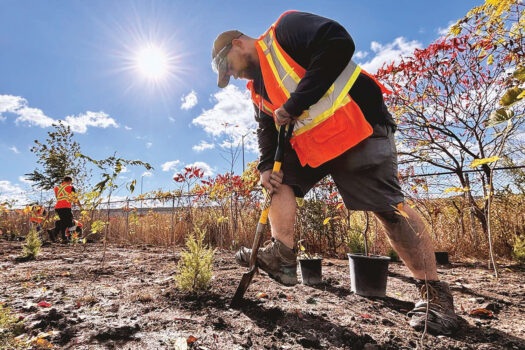 Does the landscape/horticulture profession have an image problem? If so, what can be done about it?
Does the landscape/horticulture profession have an image problem? If so, what can be done about it?
I often hear that our profession has a public image problem. It is one of the reasons we have difficulty attracting young people. This is true of most practical trades. There seems to be a societal stigma in North American against all jobs that require physical labour. To be honest, we too, are guilty of looking down at many jobs.
On a personal note, my father (an immigrant who worked as a labourer most of his life) did not want me to work in the landscape field. Back when I was as a student in the Landscape Technology Program at Humber College, we spent the first month weeding garden beds in the college arboretum. My father was shocked when I told him. Even as a labourer, he had a poor image of hands-on work.
After graduation, my first full-time job was working as a gardener at Centennial Park Conservatory. At social events I was often asked what I did for a living. When I answered proudly that I was a gardener, I could tell others were not impressed. The first question would inevitably be, “What do you do in the winter?”
A number of years ago, Landscape Ontario was involved in a pilot project that allowed interested grade 11 students to graduate high school with a major in Horticulture. This program has now been expanded to over 20 schools. Some of these programs are now being threatened because students don’t understand the many viable careers options available in landscaping. Often, students who are having trouble keeping up academically are encouraged to take more hands-on courses. This image problem continues within the education system.
A number of years ago, we had the opportunity to ask four groups of university students how we could make the landscape/horticulture profession more attractive. The overwhelming advice was to focus on entrepreneurship. It seems practical work has a bad image unless you are a business owner.
How can we combat this image problem? Here are a few ideas.
Looking back on my month-long weeding experience at Humber College, the teachers interspersed the work with training. We had to learn weed identification. We had to research the history and characteristics of the various weeds we were pulling. We associated different weeds with different soil types and compaction levels. We learned about herbicides and how they worked on specific species, depending if they were monocots or dicots. We learned how to collect and press specimens for future study. I still remember the botanical names of many weeds. To me, a dandelion became Taraxicum officinale. I learned how Linnaeus developed the binomial taxonomic system based on reproductive structures. All this certainly made weeding much more fun. I even felt pride because of my new found knowledge. It was a great experience. Knowledge builds enthusiasm and pride. It is also a motivator and an attitude-changer.
What can you do to stimulate pride and enthusiasm in your work culture? Elevate your business and help counteract the image issue one person at a time. Focus on mastery, knowledge and professionalism.
Another important lesson learned from my weeding experience was that the work was way more tolerable and enjoyable because we were building an arboretum. We had a clear goal and a common purpose. Our work resulted in a beautiful garden to be enjoyed by many. We were building a park that would generate profound benefits to future generations.
There is a well-known story about two labourers who spent many years shoveling and moving material with a wheelbarrow. One was burdened and unhappy because of the back-breaking work that seemed to have no end. The other was happy because he was involved with building a cathedral.
The point is that practical work is much more enjoyable when there is a well-defined purpose. Purpose is motivating. What is our broader purpose? How do we communicate our purpose to our staff team? Hard work is made easier when we know our work will change lives, make people happy, create a positive difference and enhance the environment.
I am reminded of what one of James Garfield Thompson’s customers told him about his team: “You are a green force for beauty.” Another of our members articulates his company’s purpose as “stewards of creation.” The purpose of Oriole Landscaping is to make their customers “fans.”
We have a collective opportunity and responsibility to counteract our image problem by encouraging mastery and continuous learning opportunities in every member of our staff team. Articulating and communicating our collective purpose as individuals and companies is also an important way to improve our image.
We are in a business that contributes economic, environmental, health, lifestyle, therapeutic, aesthetic and legacy benefits. Showing others this truth should not be that hard.








